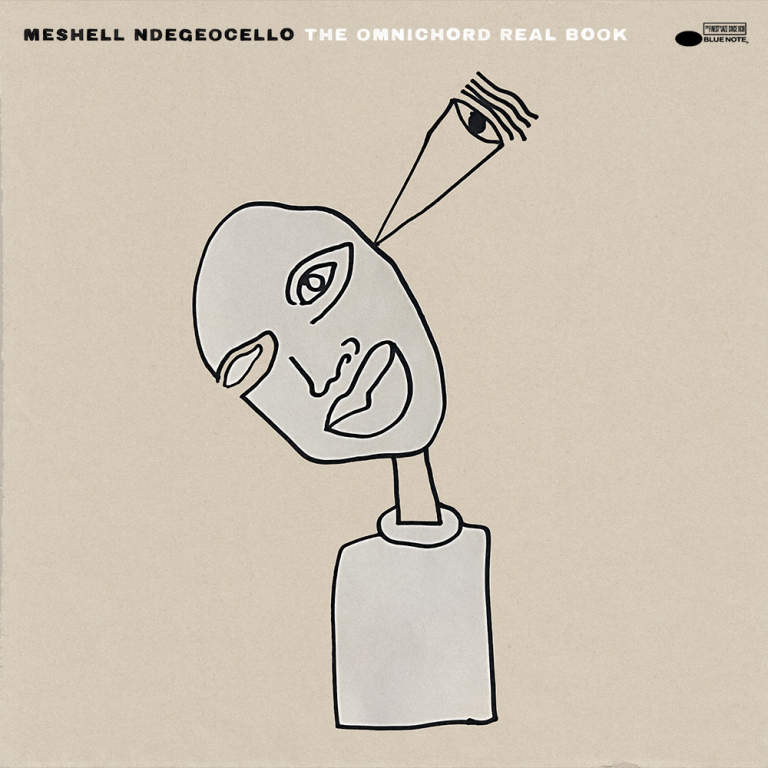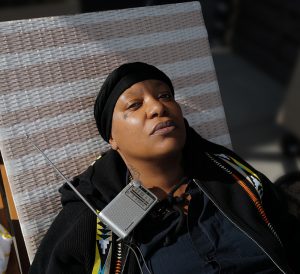Fun fact about Meshell Ndegeocello: She actually rapped on one of Madonna’s albums as a replacement for Tupac Shakur. The year was 1994, Madonna and Tupac were secretly dating, and Meshell had released her debut album “Plantation Lullabies“ on Madonna’s Maverick label the year before. So when Madonna decided against featuring Tupac on her record, she asked her young signing into the studio to collaborate. The result can be heard on the song “I’d Rather Be Your Lover”.
But Madonna was not the only artist that felt inspired by Meshell’s wild fusion of hip-hop, funk, soul, jazz and poetry. Paving the way for neo-soul artists like Erykah Badu or Jill Scott, Meshell Ndegeocello has remained somewhat of a “musician’s musician“, while still managing to land a few unexpected hits in the 1990s and gathering a loyal hardcore fanbase.
When Meshell finally won a Grammy in 2021 for “Better Than I Imagined“, a collaboration with pianist Robert Glasper that won the category “Best R&B Song”, it was “quite a shock“ to her.
“I wasn’t even a member of the Recording Academy at this point.“ At the same time, it felt like a late recognition from the industry side. “I always wanted to be a good songwriter, not the best bass player“, she admits.

Born Michelle Lynn Johnson in 1968 as the daughter of a health care worker and an US Army Sergeant (and saxophonist), she spent the first three years of her life in West Berlin, where her father was based. Later, her family moved to Washington, D.C.; playing bass in bands on the local go-go scene in the 1980s, Michelle adopted her artist name Ndegeocello, a Swahili term she says translates to “free like a bird“, and tweaked the spelling of her first name. Known for her explosive live shows, she released her debut album as a 25-year-old in 1993, exploring lyrical themes of sexuality, race, gender and colonialism. Mind you, that was 30 years ago.
Meshell’s newest album, “The Omnichord Real Book“, continues a tradition of eclecticism in her work. Asked about the musical inspiration for the record, she makes clear that she’s not interested in preserving any type of genre tradition. “I was listening to Talk Talk, Moroccan music, Neil Young’s ‘Harvest‘, Jay Electronica, Nusrat Ali Fateh Khan, Sun Ra, and Taylor Swift”, she specifies, and then adds: “During the making of this album, my focus shifted to pulse, harmony, and simplicity.“

MESHELL NDEGEOCELLO The Omnichord Real Book
Available to purchase from our US store.In the last decade, Meshell went through some tragic life events, including losing both of her parents. Also, right-wing extremism gained popularity in the second half of the 2010s, fighting everything that Meshell as a Black queer artist stands for. “I woke up to my own delusion of making music“, she says. When Covid hit, she was still going through a mourning phase. “I just took a break. Covid allowed me time to take walks, and do nothing. I watched those before me pass away, so I just enjoyed time, travel, and music. I did some film scoring. Then I found my old real book, which was the spark of the recordings for this new album.“
Now a real book is a collection of transcribed jazz compositions, but Meshell makes it clear she doesn’t like the term “jazz” as a descriptor for her music.
She’s referring to musician Nicholas Payton, who in his provocative 2011 article “Why Jazz Isn’t Cool Anymore“ wrote: “Jazz is a brand. Jazz ain’t music, it’s marketing, and bad marketing at that.“ Meshell agrees with that notion: “Jazz has morphed. It’s a generalisation to sell something, and I can’t buy into that.“ Just like Payton preferred the term “Postmodern New Orleans music“, she would like people to see her songs as “Black American music“.
Looking back on Meshell’s rich discography, there’s two main musical threads that seem to run through her work. One started with the album “Bitter“, a fan favourite from 1999 that showcased her gentler singer-songwriter side, referencing artists like Joni Mitchell or Neil Young. This thread was continued on later albums like “Devil’s Halo“ (2009), “Weather“ (2011), and “Comet, Come To Me“ (2014).
“The Omnichord Real Book“ on the other hand seems to relate more to the eclectic, upbeat style of albums like “Cookie: The Anthropological Mixtape“ (2002) or the traditional jazz leanings of “The Spirit Music Jamia: Dance of the Infidel“ (2005). The strong jazz influence shows in her list of collaborators on the new record, from Jason Moran to Ambrose Akinmusire, from Jeff Parker to Brandee Younger.
But the new material also leans heavily on elements of Afrobeat, R&B, and even contemporary electronic music. At times, it seems to reference the sound of the 2010s L.A. scene around artists like Kamasi Washington, Flying Lotus, and Kendrick Lamar. In that sense, “The Omnichord Real Book“ does the magic trick of sounding timeless and contemporary at the same time.

After having been signed to Madonna’s Maverick label for the first decade of her career, Meshell went through a lot of different business situations but now seems to have found the perfect new home at the Blue Note label. “It’s a dream come true“, she says earnestly. “It’s been a great experience, especially being on a label where the head also makes music. You know, people used to dream about a record deal, and then Prince hated having a record deal. I lived in that Michelangelo stage where I thought I’d need to look for a patron, but then I understood we’re all in a dance together.“
Stephan Kunze is a Berlin-based culture journalist who has been writing about music for magazines and newspapers since 2001. He’s a former Senior Music Editor and Global Editorial Lead at Spotify.
Header image: Blue Note Records


